#fine line analysis
Explore tagged Tumblr posts
Text
Fine Line (The Song) Analysis
This song is so special to me and has grown to be such for many, too. The song that gifted the album that it occupies its namesake. Radiant with evocative nature and effectiveness to conclude. But, not an ending, per se, but rather a summarization and culmination. All its six minutes are vehement and all-consuming, encompassing a layered tapestry of adolescence, acceptance, and flux. The beauty in this song is that a singular subject can't be pinned down, but, rather, flutters between many, depending on who's bearing their soul to the listening experience at that moment. An anthem holding many senses, all that can coexist & happen all at once. A chorale to life's nature of duality.
Here's a deep dive into Harry Styles' Fine Line, from a poet.
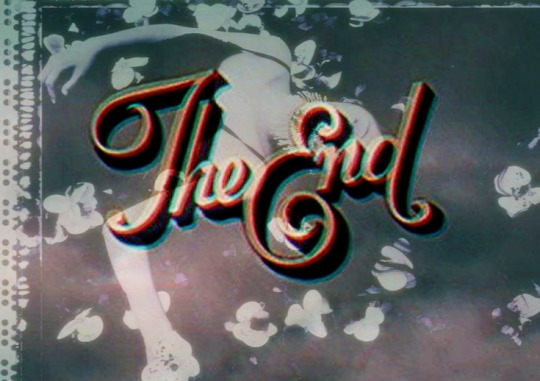
Terms & Summations
What the hell is a "fine line" anyway? Great question, you in the pink and blue, in the front there! Yes, I admit, that was an unbearably cheesy way to start this section, but I'm itching to just get on with it. So... let's go!
A fine line is a balancing act, a tightrope, a suspension between the extremes. A small difference or distinction. The grey area between the black and white. Finding the right footing on this line is a difficult feat and something that ought to be discovered through time and maturity. With the chronicling through the song, and in the journey taken across the whole album, he's indicated that he's closer to this point than ever before. And, he feels an added sense of euphoria in knowing he'll be alright. And, similar to the preceding "Treat People With Kindness", he's extending his hand, wanting to share this acceptance with any who offer their ears.
A declaration, hope, a promise. Then, bring in the brass and the strings and the building crescendo, as the symphony of movie-credit-worthy emotions sweeps all toward a sense of closure to the art itself, of course — but simultaneously, a closure of acceptance of the duality of life for all who need to be guided toward it.
This guides us perfectly into revisiting that Fine Line is a song tailored to conclude. It's a summation of the sophomore album, a thesis statement, and the concluding slide of the journey — though, one can assume the trip continues indefinitely with some thematics. There have been tests of patience endured and acceptance of being unable to find all the answers to all the questions of life. One thing I find very essential to this song and understanding its impact is how he refuses to sugar-coat his words anymore — a lot of what's said in this song is direct, showing a maturity found through these trials and tribulations, these highs and lows we've seen flux throughout the album in its entirety.
It stands alone on the fourth side of the album, categorized as SIDE D respectfully. In following my own personal theory of the stages of grief, we stand at acceptance, a destination, or maybe the beginning of the travels. As a finale, Fine Line is very poignant, just the listener and one song left to ponder. Room has been left for this — to reflect upon the sadness and uncertainty seen earlier in the album, but also how there's happiness that exists beside and beyond it, with everything interconnected or divided by the fine line.



Lyric Pull Apart
[VERSE 1] Put a price on emotion I'm looking for something to buy You've got my devotion But man, I can hate you sometimes
Put a price on emotion / I'm looking for something to buy: Imagine this. One walks into a store with all these jars lining the shelves. Get a closer look down each aisle, and each jar is labeled with a different emotion as price tags dangle from the lids. Prices may vary. But... why would one buy something that one already makes? Why go artificial in what was once natural? The answer is in the riddle itself, and there in the first lyrics heard.
The ability to feel naturally has fallen flat, a consequence of the emotional strain of the push & pull that'll be explored in depth soon. And, one can become desperate, begging to feel any emotion, at any price, as they feel themselves falling numb. He would do anything, pay anything, just to feel again. After having rationalized detachment from emotions for so long... what was once naturally acquired (like joy, sadness, love, etc.) can now only be purchased as a tangible, artificial item. He's lost faith in himself, a bit. In addition, a debate surrounding pouring emotions into one's art — especially one's art that's put out on a larger scale — is invited inside here. How much is genuine? How much does one show? How does one stay authentic without giving away too much?
These first lyrics are critical, as they're the second-to-first impression of the song. It introduces us to the headspace the writer was in to start, and preps for the upcoming arc. Cynical with desperation is how I'd describe those first two lines, as we prepare to enter the fluctuation.
You've got my devotion / But man, I can hate you sometimes: Something done very well within this piece is the use of antithesis or contrast. It not only serves as an illustrator but also further emphasizes the fine line notion. And it won't be the last time he utilizes this, for it encompasses both the album and the song. Devotion is such a strong word to use here, but its strength is used intentionally to amplify conflict. A word defined as "love, loyalty, or enthusiasm for a person" is closely followed by an admission of hate, which sends the listener into the same confusion the speaker must've felt then. The irregularities in love and life are encompassed. In the experiences we all foster. It will never be 100% euphoria, but rather a 50/50 bet between bliss and hell.
But, you know, from time to time, the bliss can outweigh the suffering. Until one hits a breaking point — see the first couplet of lyrics. He's feeling the pressure and melancholia in the haze of confusion stemming from this conflict. Whether external, internal, or a compilation of both. His emotions battle one another, leaving him confused about what he actually feels. This person has his devotion, but at any time, it can cross to the antonym, the threshold of hate.
[VERSE 1] I don't want to fight you And I don't want to sleep in the dirt We'll get the drinks in So I get to thinking of her
I don't want to fight you / And I don't want to sleep in the dirt: Another example of antithesis here. Continuing this push and pull, a lingering sense of fear and hesitancy. He doesn't want to get mistreated, but he also doesn't have the energy to fight anymore, for the constant back and forth has grown tiring. And he's been drained.
We'll get the drinks in / So I get to thinking of her: I believe this can mirror the very first lyric of this verse, in terms of numbness. A representation of falling back on something — here specifically, alcohol — an unhealthy coping mechanism explored in other ways and places in the album, to break down his subconscious walls. He seeks something to ease the pain he knows is coming 'round the corner. The her referred to could be as basic as a past lover, sure, but also the weight of something much more generalized. Something bigger than even the speaker himself. Which I think isn't to be ruled out so prematurely.
[CHORUS] We'll be a Fine Line We'll be a Fine Line We'll be a Fine Line We'll be a Fine Line We'll be a Fine Line We'll be a Fine Line
We have arrived at the beautiful, pivotal phrase, on its first round of repetition. To walk a fine line is to maintain a balance, or to be very close to two different ideas/attitudes simultaneously. One side is often more acceptable than the other, but we must embrace all in balance. Throughout the song, I visualize the speaker balancing on a tightrope, all these concepts bouncing up to his eyesight on both sides, all in rhythmic melody to the sounds behind his words. At times, he might stumble, but he sustains his balance, standing on the fine line.
There's a fine line between love and hate. There's a fine line between happiness and sadness. And etcetera, for one could go on for days and weeks with this concept. But we'll balance on that fine line, as we navigate where we're set to land. And, in this round of repetition for the chorus, it feels as if us, the listeners, are eavesdropping on the speaker trying to convince himself of this.
[VERSE 2] Test of my patience There's things that we'll never know You sunshine, you temptress My hand's at risk, I fold
Test of my patience / There's things that we'll never know: The starting couplet of the second verse, starting with an acknowledgment of the unknown. Further, the acknowledgment of the feelings associated. A waterfall of thoughts he dwells on, and my assumption is that it falls into what could've been. This feeling of dissatisfaction, and, like many other parts of the song, can be construed depending on the glasses worn. But, with said dissatisfaction, there's also an air of acceptance, which returns back to the theme of duality and balance.
In his dissatisfaction of the unknown, he accepts the lack of patience and the growth of frustration that results from these revelations. Acceptance of pain that seeps into devotion that can further blind you. Acceptance that one can't change the what if, but only learn from it, and walk towards perseverance.
You sunshine, you temptress: He's back at it with the antithesis, folks — a bit more subtle than the others, I'd say though. Still hauntingly poetic and reflective of how deep his infatuation can go. Can't go much further without mentioning how it mirrors Woman, and the lyric "You flower, you feast" structurally. The connotation of the first you (You sunshine) is something beautiful, while the connotation of the second you (You temptress) is ominous. It parallels the juxtaposition of care and resentment established in the first verse.
Once more, the theme of duality and life's balance is furthered. In Golden, the opener to this album, the subject is referred to as golden and bright — positive and complimentary. Now, in the closer to this album, it's punctuated with the label of a temptress, slicing through the tenderness with something soul-stirring. There's another similarity to Woman, how they both touch on temptation, but, in Fine Line, he's admitting that neither party is completely innocent or guilty. Rather, they both have a little of each.
My hand's at risk, I fold: Moving on then to this analogy to poker, which I find to be an intriguing choice. The person he's speaking to at the heart of the song has (presumably) found their way past his poker face, past his fronts, and acts and strategies to hide his emotions. Now, his poker face is down, and he's left bare and exposed, more vulnerable before them. He's been brought to this point and willingly folds.
The act of folding, where a player gives up any chance of winning the pot (the money) by sacrificing their hand (of cards) to avoid a loss of what's already theirs (money they still have). In poker, it's all about keeping a straight face and hiding your emotions to prevent the other players from figuring out what cards you have. Switch this into the song's context, and see his hand not full of cards, but, rather, emotions. And, to push further with this metaphor, the speaker is giving up keeping his cards (emotions) close to his chest and decides to fold (open up) to those who are tempting him to do (you sunshine, you temptress). Gambling also can become an extended metaphor in the song, with the mention of marketing emotions in the opening line. Poker itself is a game of high stress and risk, and the act of folding can be done to survive the iterations of poker (regular stress on the fine line).
[VERSE 2] Crisp trepidation I'll try to shake this soon Spreading you open Is the only way of knowing you
Crisp trepidation / I'll try to shake this soon: I adore how he pairs words together, and this bit right here has got to be one of my favorites. Trepidation is a feeling of fear and withdrawal. Crisp preceding it implies that it's perfected, as if he's had a lot of practice (happened multiple times before). A master in hiding his emotions, not communicating his emotions, a common theme explored throughout his catalog. Then, following that with I'll try to shake this soon — that line can act as a summarization of the verse thus far. Trying to shake the feeling of fear when it comes to bearing his emotions. But, also, shaking the fear about the uncertainty that comes with the duality on the fine line he walks and is walking.
Spreading you open / Is the only way of knowing you: One step on the fine line between emotional and physical vulnerability here. And, undoubtedly, it's a part of the song that obliterates my heart. The whole thing. His voice becomes emboldened and stronger when singing this line, such a beauty. It can taken with or without sexual innuendo. And, per usual, I'd like to travel down both roads.
Let's talk without first — the person he speaks of can have their defenses up like he does, making it hard for him to know what goes on in their mind. In this context, spreading them open would be the only way to connect emotionally, breaking down their subconscious bounds, which could've inspired him to follow suit. Now, let's talk with — connecting emotionally is an act of vulnerability neither party allows themselves to do, so bring in the contrasting ease of a physical connection as everything else gets swept under the rug. In this context, spreading them open would be the only way for him to remain in contact with the other person, for conversations of emotions and deeper connections are just too much for both involved.
Through this, another contemplation of the fine line is introduced, the fine line between vulnerability and neediness, and how this is another tightrope he walks on throughout the song, as the listeners, his audience that he has chosen to share this journey with, watches in wonder.
[CHORUS 2] We'll be a Fine Line (x12) We'll be alright We'll be alright We'll be a Fine Line We'll be a Fine Line We'll be alright
Another round of repetition with a beautiful, pivotal phrase. But, there's something different here, a switch in the narrative. To refresh, the first repetition was him convincing himself — but, now, in the second round, he's convinced. He believes in it. This bout of repetition holds acceptance in its hands, the speaker's acceptance of the good and the bad, the highs and the lows, the beautiful and the ugly — the fine line that threads its way through it all. He's reassuring and reminding himself that it will work out, and he will grow from what's learned. And, musically, the poetics grow in companionship with the lyrics.
First, the guitar gets bolder as the strums grow more aggressive, a complete shift to the ear from where the song started. The rising guitar can symbolize the change, in both a relationship but also the person the speaker has become. And, the piano gets reintroduced, and I hear it as hope returning — our beautiful hope has her own melody. And, one can't overlook the strings... pure magic. With this shift in the music, the listener, too, feels the change that he must've felt. This change in outlook — these experiences are painful and feel like it could be the end of all ends, but one grows from them. Now, both he and we recognize this, and accept it. We'll be alright. All these instruments come together to build the anticipation for the switch to We'll be alright. Reassurance, for the listener and the speaker, that it'll all be okay in the end. He validates the lyrics of the song, the chronicles of pain, to whoever is listening — but, more substantially, himself.
[OUTRO] (We'll be alright) (We'll be alright) We'll be alright We'll be alright Oh
Well be alright, we'll be alright, we'll be alright. Repetition in reassurance.
Looking back to when first discussing the song as a whole, this is a song tailored to conclude. This is his way of emitting a small glimmer of hope after going through it all across the album. The honeymoon phase, the connection, the love, the heartbreak, the loneliness, and even self-defeat. All instances explored in the album as a whole, are summarized into a lesson for whoever lends their ear. The fine line! He's now sharing that hope with us, the listeners, giving reassurance he didn't always have, creating an accepting friendship letter to the duality of life and love. Now, he can look out to his audience — whether one person or thousands — and tell what he once only repeated to himself: We'll be alright.
It's a crisp summation of all the places he traveled on the album, and all things laid bare. A song of emotional maturity where he realizes that emotions, life, and relationships — they all have a duality to them, and are all in a balance, one all strive to find. A fine line is balanced, a fine line to walk is inevitable. A windsome culmination of his own self and his own journey. The self in art, the self on its own, the self with another. The travels, the chances, the fears, the passion. Hope. Reassurance. Confidence. Acceptance. Flux. And, most important to take with you as you go — promise me that you'll keep it close to your heart — is the knowledge that everything will be alright at the end of things.
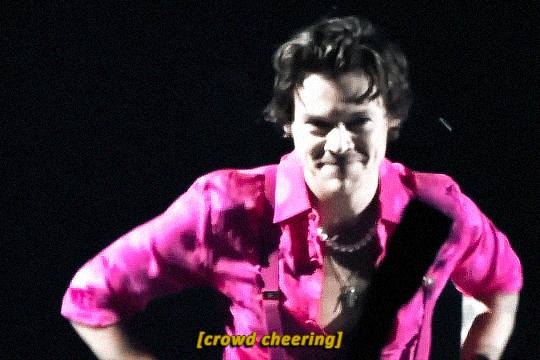
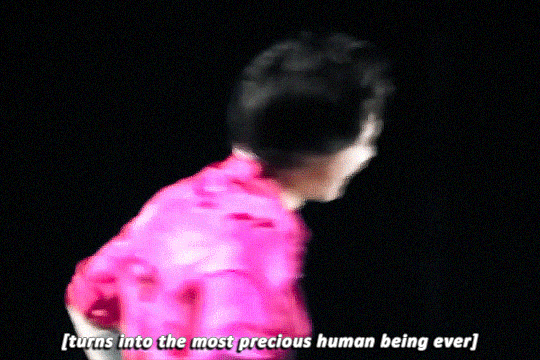
dedicated to this anon <3
Thank you for reading, you’re absolutely incredible! If there are any songs you’d like me to make an analysis of, please send your request to my inbox! along with any questions or insights you might have yourself!
#fine line#fine line analysis#fine line lyric analysis#harry styles lyrics#harry styles lyric analysis#fine line song#fine line album#fine line lyrics#fine line album analysis#lyric analysis#harry styles#my posts#my analysis#opinion#commentary#discussion#theory#music#harry analysis#just close your eyes and float#pure poetry
8 notes
·
View notes
Note
i don't know why i'm unable to comment on your anon asking for fine line analysis so i thought i'd try here 😭😭 here's my fav analysis ! and here's another cause people have such beautiful brains.
Thank you!!!
6 notes
·
View notes
Text
The more I think about it, the more I question Arcane S2's politics and themes, which were so foundational to S1. Like, a tiny example [SPOILERS AHEAD]:
Singed wins. He gets exactly what he wants in the end. All his "efforts" are rewarded. What does that say about people who share his ideology of eugenics? He is the source of nearly every horrible thing and conflict that happened (Shimmer, the factory deaths, Jinx, Vander as Warwick, the corruption of Viktor), and he gets a happier ending than any other character. Not even a 'he got what he wanted but he has become completely unrecognizable/monstrous to his daughter' tag at the end. You can say they're setting him up and need to open his daughter to future shows, but the way you end a character's story says something about what you think about that character. What does it say when the eugenicist war criminal gets the happy ending he doesn't deserve?
#personal#delete later#and you can say “it's not that deep it's just what makes sense to end his character” but lets not kid ourselves#this past month people have been chattering about microexpressions in animation or metaphors and symbolism in interactions#and random props and set details. the end of a character's arc MEANS something thematically.#and it just feels offputting that the most unforgivable character wins while everyone else is dead or suffers alone#and don't give me that “sometimes the bad guy wins” look this is an extreme lol.#i would be fine with this outcome for singed if literally EVERY other character wasn't suffering. only singed got what he wanted#honestly fans who have been completely unwilling to consider negative analysis and criticisms of arcane annoy me so much#y'all chirp about how amazing it is that arcane is so political until the politics get weird. then it's a completely apolitical show#specifically the final “dirt under you fingernails” line. that felt so weird and offputting coming from vi#a part of this is definitely just reactionary anger at a fictional character. like. you caused untold amounts of suffering and agony#all for your daughter. fuck you you don't get your daughter
326 notes
·
View notes
Text
HATE that I'm randomly remembering this post relating to shuichi's development because I feel like crying now
still can't fathom the people who say saihara had no development like the fuck? sorry but did you play the game
In chapter one, Saihara is weak- he relies heavily on Kaede and sticks with her for practically the whole chapter
In the trial, he is too scared to reveal the truth of the crime to everyone, fearful of condemning yet another person
the biggest point to mention here, though is that Saihara didn't try to stop her death. He's not strong enough to at this point

Kaito is furious, exclaiming to him that he *should* have done something, that she had BELIEVED in him, and that she had 'passed her wish' onto him, yet he did NOTHING to stop her death
let's just say saihara definitely took this to heart- (5 chapters later of growth and support thanks to kaito and look here)

this line-
THIS LINE DAMMIT
IT SHOWS HOW MUCH SAIHARA HAS GROWN
KAITO PUT HIS FAITH IN HIM AND HE'S MANAGED TO CHANGE HIM FOR THE BETTER
#this is no analysis post because I suck at those#I just feel really passionate about this line because it showcases saihara's development PERFECTLY#shaking all the saihara haters by their shoulders and showing them this evidence#it's fine to not like him but I better not hear anyone say he has no development and stays a weak pathetic ass without change#sksksk I love shuichi's dynamic and relationship with kaito so much I'm rambling like a madman#I could add soooo much more to this but it'll basically turn into my regular saimota word vomit so let's not#shuichi saihara#kaito momota#drv3#drv3 spoilers
151 notes
·
View notes
Text
When discussing or analyzing Dazai, one thing I hope you will keep in mind when reading anything I write about him is that from my perspective, he is always, always both.
What do I mean by this? Well, I find there tends to be a general split among people who hold the opinion that "he's a manipulator and will always be manipulative" and "he's doing his best to be good and helpful and live up to Oda's last wishes for him", of which, neither is completely right - because he is both. But even among the people who hold to this dual-nature interpretation, I find that his individual actions and motivations still tend to be thought of in a dichotomous manner - is it manipulative, or genuine?
Again, I think it's always both.
Dazai has a very pragmatic view on a lot of things - he is always looking for the usefulness of things and people so that the situation turns out in his favour. He's incredibly adept at this, and his prediction and placement and careful reveals are all manipulation tactics to get his allies and enemies doing exactly what he needs them to. I don't think anyone can contest this since we see it over and over in the series.
But that's not all there is to it. He's not solely manipulative and he does, to some extent, sympathize with others - I think there are several instances of this in the series, but I want to stress that this has been apparent since Chapter 1!
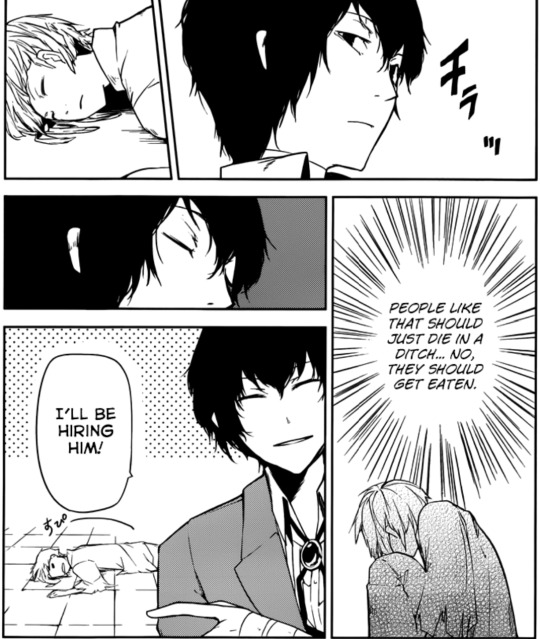
For context, Dazai is recalling what Atsushi said to him a few minutes earlier, but it's very interesting that it should be this specific part of the conversation. He could've flashed back to the part where Atsushi said he had nowhere to go; no money, no food - he is about to trick him into joining, after all, and this is the key piece he uses to basically force Atsushi into the Agency. But instead it's Atsushi's self-deprecation that catches his attention, and it really does, because even during the conversation, he turns to look at him after he says this with an odd expression.
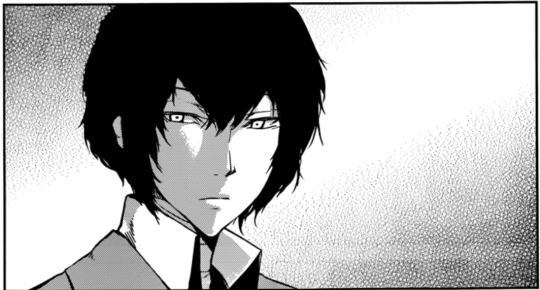
You could say that this makes Atsushi easier to manipulate, if that's your angle, but that can't be solely it, because in the later conversation with Hirotsu, we know Dazai was planning to bring Atsushi into the Agency and set him up as one half of the new Double Black the moment he met him. The panel shown there is the riverbank, set much earlier in the day than this scene. He was already planning to pair him with Akutagawa since he figured out he was the tiger, so what's with this reaction?
Well. Sometimes the simplest explanation is the best.
He manipulated Atsushi into joining with the intention of utilizing him in his future plans. He also helped him and gave him a place to belong, and importantly, he likes this kid! It's both.
I think much of it might be that his brain just kinda works way too fast - he's such a natural at crafting these elaborate plots and seeing how things connect and gathering useful people like resources that it's practically automatic - though this is not a great means when you're trying to be a kinder person. There's an omake, I believe, that has him saying "I like using my head for justice", i.e. using these underhanded means to act for the better. Not great, but those are the kind of gifts he has. He's way more suited to exploitation, but is choosing to use these tactics to save people now, which is quite reminiscent of what he tells Kyouka. Kyouka's talents lie in killing people - when what you're good at isn't who you want to be, what do you do? Well, I expect you use what you have, even if it's not ideal.
Now, about the current situation with Sigma - I think he definitely likes him, and is intrigued by him and his situation. We did get a little thought bubble where the guy amusedly compares him to Atsushi, and you can't tell me he doesn't care about Atsushi (listen to the onsen drama cd, or read 55 Minutes if you somehow don't believe me). But also, it's undeniable that Sigma is in a very vulnerable position of being homeless and having had no one be genuinely kind to him before. His trust is very easy to earn, and with the latest chapter, Dazai has now saved his life multiple times. There is, as always, a practical purpose he needs him for. And I have to be somewhat amused because Dazai is quite literally telling Sigma everything he ever wanted and needed to hear. It's a brilliant means of quickly endearing himself to Sigma - but I don't think that's all it is.
Look. The most honest moments we get in this series from Dazai are, interestingly for an expert manipulator, when people are at their most vulnerable. In spite of every pointlessly cruel act he inflicted on Akutagawa, his first meeting with him was open and transparent; much like the orphanage director, it seems he thought this treatment would make him strong and adaptable (he's wrong but that's not the point of this). He cuts Kyouka off in irritation and says "don't give me that" when she implies that she would fail the entrance exam. He tells Atsushi it's normal to cry after losing a father figure and to feel however you feel, even if that person caused you nothing but incredible pain and cannot be forgiven. He refuses to entertain Sigma's assumptions that Dazai sees himself as a superior being to him.
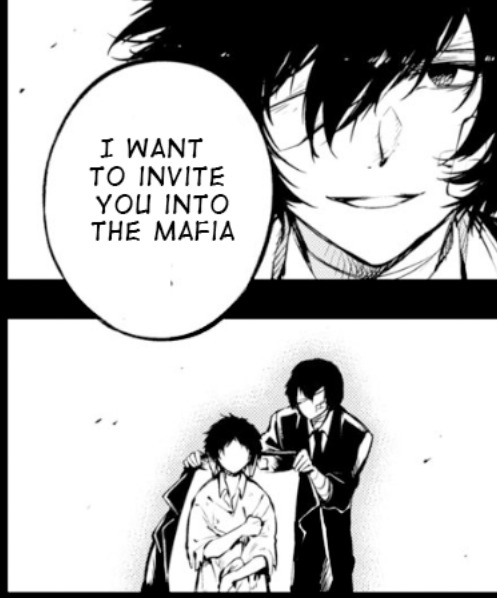
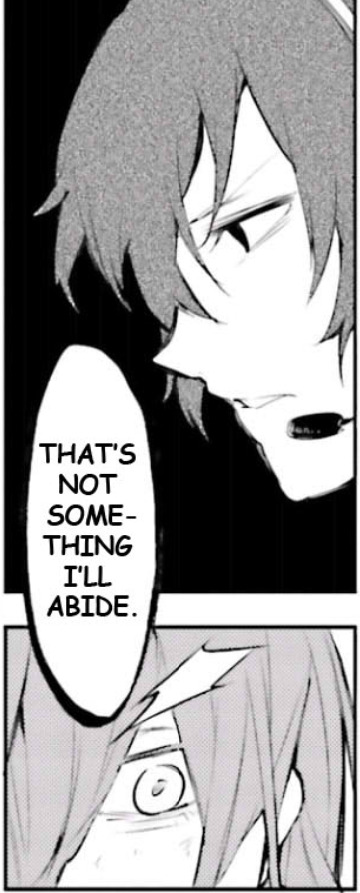
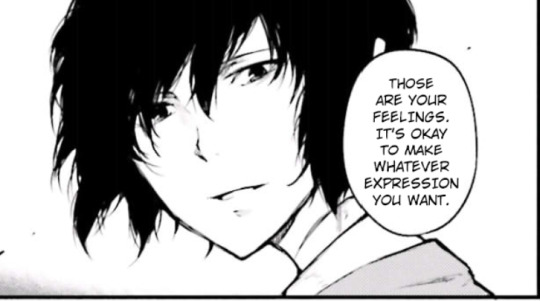
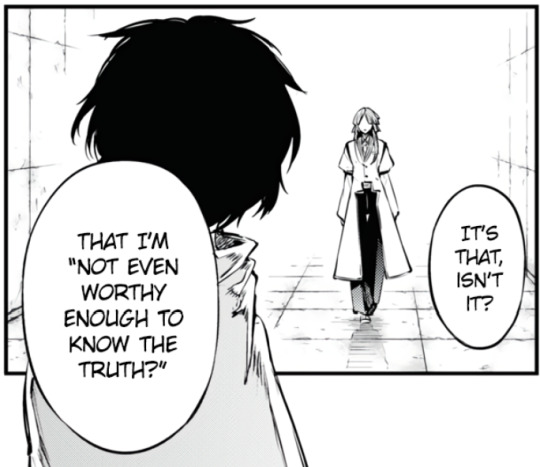
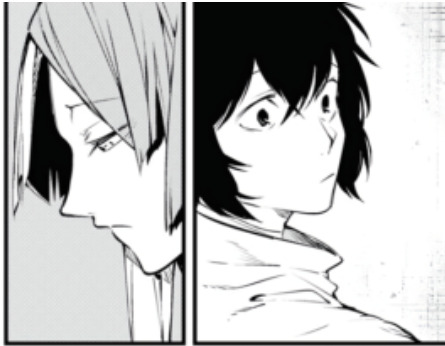
Selective honesty can also be utilized to great effect; Mori does this, and undoubtedly it serves this purpose for Dazai too. But I want to stress that I do sincerely believe this is all still honesty from him. Manipulation, or genuine?
Both. It's both.
#or to summarize: Dazai is a gemini (derogatory)#<- said as a fellow gemini (also derogatory)#the few exceptions to the always both rule are basically any of his interactions with odasaku#and the bit in sb where he tells chuuya about what activating corruption will entail#most everything else appears to have a dual reason.#to be clear: there's lots of ways to interpret dazai - but this is the approach i personally use in my analyses#so i'd love it if you guys would read my dazai analyses keeping this standpoint in mind :)#i think instead of debating 'is dazai bad' which is seriously kind of irrelevant to me#i'd love to talk a bit more about how dazai is actually quite helpful but also equally presumptuous about what will help people#we could also talk about the fine line between protectiveness and possessiveness with him too.#or about how drawn he is to kind people who value life likely because he's hoping to find answers or a vicarious experience#anything except the 'is he good or bad' debate. i don't like it. :/#bsd#bsd meta#bsd analysis#bsd dazai#storyrambles#oof i never know how things like this are going to go over.
796 notes
·
View notes
Text
Detroit Become Human and why does this game decide that the problem in society is individual people treating androids poorly because those androids are choking them out of the workforce and NOT the corporations and governments who deliberately designed the androids to do this
#AUGHHGHH#I promise you dbh is still one of my favourite games I really do#But ohhhhhhhjghh my GODDDD it makes me mad#Like ESPECIALLY this year. With artists and writers being so fucked by ai#Like the game has less than no sympathy for people who were screwed over by cyberlife deciding their labour wasn't worth anything#Like everybody has to be a strawman. Everybody has to be the violent 'android bad because (some vague reason that draws on the#'immigrants are stealing our jobs' line despite the fact that these things aren't equivalent at all)#Like yes. Robots being placed in positions where a real human would be paid a real wage to do that job is bad. This is a bad thing#But the game. Does not CARE#It's so morally neutral for cyberlife to be allowed to mass produce androids in the middle of a poverty epidemic that they created#It's fine! Says Detroit Become Human because everyone rendered homeless or struggling by this company's actions is a violent drug addict#Or something#It's like HUH#H U H#This game was so enamoured with it's weird bad civil rights allegory that it forgot that people do actually need jobs to uh. Pay to live#Because things are hell#And I think it could've been SO much better if the game acknowledged this AS WELL as acknowledging that no android chose this#Like a fresh deviant didn't ask to cause a real person to not have a job. The company who made them did#But dbh doesn't care. Cyberlife is morally neutral in this. I swear#Loses my mind this game is such a mess#Uhhh if anyone's reading this please don't get mad at me I promise I do really love this game. Like this game is the reason I#Met the love of my life. I am physically incapable of hating this game#I just think it's so worth discussing the ways it fails in (what I think is) a constructive manner#detroit become human#game analysis#I guess#If anyone has any contributions or disagrees with me I would LOVE love to hear. Genuinely I love talking about things like this#Essay in tags
42 notes
·
View notes
Text
Intersectionality is something that, sadly, is often pushed to the side in Arcane discussions, specifically from a certain side of that fandom. They will go on and on about Viktor, as they usually do, talking about how he suffers from classicism and ableism within the show and fandom respectively (as they should as these are issues, but there is a catch when it comes to these fans as well), but when others in the fandom, especially Mel or even Sky fans, point out the racism and misogyny (misogynoir) that is often rampant in this fandom, particularly from said fans mentioned prior, all of a sudden its not possible or being overdramatized. Like they suddenly can't understand how some of their rhetoric includes or invites the same thing black fans have been calling out since the beginning, because how can you discuss the ableism and such that Viktor faces, but laugh or joke around with people who call Mel slurs or just denounce her to a trope? I thought you were for calling out forms of hate within fandom, or does your "activism" only stretch so far? And back to a previous statement, about the catch regarding those particularly fans----some of them regurgitate the same harmful rhetoric towards Viktor that they say they supposedly hate, just in mode subtle ways. How are you going to say you hate when Viktor is infantilized, but will be quick to forget he's a grown man who can defend himself (often when trying to pair him against Mel, framing her as the aggressor, and sometimes even Jayce too but to a lesser degree)? Not saying Jayce doesn't get equal amounts of hate, but his more so gets pushed aside along with his character to ultimately frame Viktor in higher regard, often making him ooc. It's like they pick and choose when the issues are prevalent, and when they aren't, and it's so frustrating.
#and it's so annoying to see as someone who for actually doesn't mind/kind of likes viktor as a character bc whenever i try to interact more#with him in fandom these types of fans make it so hard bc they overwhelm you with things that are so out of character that they practically#rewrite arcane to where viktor becomes overt stereotypes and looses what made him interesting to begin with#like you can hardly find analysis on his character at the end of s2 and how that is ACTUALLY SAD without getting the 3rd degree or see#j*yviks paint it as romantic#and it's very gross how they often frame viktor in this way to frame poc characters (like mel or jayce) as aggressors while ignoring how#everyone in arcane is flawed (including viktor) to different degrees and how characters can disagree without actually hating one another#(this is especially prevalent regarding melvik where people act like it can't happen bc mel “looked at viktor wrong”#but will be the same people to ship jayvik even though jayce was classicst as well....noticing)#but it's very weird how they only always talk about mel in regards to how she is around viktor & nothing else but complain about how mel#fans don't understand her---which is bs bc you'd be hard pressed to find many mel fans who don't write 1k thesis on her#heck some even say that the council bombing was justified even with mel being there!#and if they really want to go into detail about how mel's class and inaction impacts zaun fine go ahead but why stay silent#when people point out how she eventually changed and strived to help them or how viktor ended up causing more harm than good down the line?#like these could be great narrative stories for how one character starts with wanting to help those in need but becomes corrupted by his#own ambition and ends up becoming a bigger threat than what he and others like him suffered with before#but no it's easy for them to paint mel = bad and viktor = smol who can do no wrong#arcane#anti arcane fandom#arcane viktor#arcane mel#mel medarda#fandom criticism#fandom racism#fandom misogyny#also bc you can tell these people are on some bs bc they'll rave about how mel didn't care about zaun (which is untrue) but turn around and#say “but jayce-” like he wasn't causing zaun trouble as well#like im all for being critical about mel's complacency about zaun and all but don't act like jayce is any better#matter of fact why even try to do that? what purpose did it serve when there's literally proof against your point? hmm
22 notes
·
View notes
Text
I support whatever the hell team PE has going on like yess girlsss make an entire civilization literally underneath you and your teamate's feet so that you can forcefully get your teamate to reveal to you his sick and twisted secret yesss girlss !!! Instead of confronting him normally like a normal person 🤩🤩🤩 !!
#“I want you to be happy. I want us to be happy” SO HEY. ECOREIDOR YOU CANT JUST SAY SHIT LIKE THAT#HEY#bee rambles#“we might be the most messed up relationship on the server in terms of team but that's what keep us different. — and honestly i think that'#how i like it“#oh. ohkay#okay pentar#shout out to team pe for dropping the most gut wrenching lines im ever heyyy !! what the fuck is wrong with you guys#im normal im fine also i have a fun ecor analysis post soon so 👀#lifesteal spoilers#oh yeah coming out as a team pe fan i was there looking at the few analysis posts on tumblr after the 1st video ☝️#alexa... start playig tongues and teeth by the crane wives#they're soooo tongues and teeth in some part and way#pentar#ecorridor
32 notes
·
View notes
Text
something I’ve been thinking abt is how many people think Makoto is immune to despair. I don’t think he is. I think becoming the ultimate Hope was BECAUSE he felt despair. He wouldn’t have fully reached that point without Junko. Makoto becoming such a beacon was his last attempt to avoid completely falling and it wasn’t because he didn’t feel despair, it was because he was too damn stubborn to allow everything to go to waste and he refused to sacrifice his beliefs for someone else’s. His inner monologue tells me he DID experience the same new low the other suvivors did in the final trial, but at the point where he had the choice to give up and die, he looked at the others and he looked at Junko and he couldn’t allow it to happen, not out of self preservation, but because the idea that Junko would have control over their lives made him FURIOUS. and that utter refusal to die kicked in, wether luck or otherwise, and he made the concious effort for one last push while something in him was breaking. He had to be broken in order for the Ultimate Hope to come through so aggressively, bc it could only exist in the face of the Ultimate Despair. He snapped the same way she did, but in the other direction. In what could have been his final moments he chose to embody everything Junko wasn’t, and every single optimistic and luck fueled ideal in him suddenly charged forward and pushed him. It was a combination of the final straw and a choice. Makoto isn’t immune to feeling despair, he’s just too stubborn to fall into it of his own volition. I think that’s why I like that scene in DR3 so much. People were SO SHOCKED Makoto actually fell for the tape, that he actually became despair for a moment. I saw people getting mad or disappointed, saying it was pathetic and Makoto seemed to fall from some sort of pedestal for them. Honestly part of me wonders if that sort of mentality, which clearly people had in universe, affected Makoto a bit. Like he started to see himself as less of a person, subconsciously. Prompting him to take more risks, less self preservation, act way more bold. It seems he has to be reminded a lot not to put himself in danger by his friends, to not do something too reckless. All over the place I would see in regards to that scene either this frivolous ‘oh this was just angst drama with no meaning behind it’ or ‘he can do better than that. he’s so weak’ or ‘come on, there’s no way he’d fall into despair, he’s the Ultimate Hope!’ This kind of mentality, which was kind of ironic considering Ryota was there the entire time saying the same thing and treating Makoto the same way. Like Makoto was superhuman. Like Makoto didn’t feel despair the same way ‘normal people’ did. In a way that was also how Munakata saw Makoto. Makoto stopped being a PERSON to the world when he became Ultimate Hope, he became a concept, a belief system, much the same way Junko ascended beyond herself. But the difference is that treating Makoto that way is the opposite of the reason Makoto became such a representative for hope. He wasn’t doing something no one else could. He was doing something everyone had the chance to, he just… was a little more optimistic, a little more stubborn, a little more ‘gung-ho’ about things. He just took the lead where no one else did, where no one else knew they even COULD in the face of Junko’s unstoppable force. She had overcome the biggest threats and obstacles in the world, what could one person do? And the answer Makoto found was, anything. Everything. It doesn’t all rest on Makoto, he’s just the one that was inspired to try to do what seemed like the impossible. But as evidenced by the change in his friends after that trial, it’s clearly not something only Makoto is capable of. The others pulled out of despair thanks to Makoto, but it was their choice to do so.
“But… this world is so huge, and we’re so small. What can we do…? No, we can probably do anything. Yeah! We can do anything!”
#makoto naegi#Danganronpa character analysis#Danganronpa#danganronpa thh#danganronpa future arc#I fucking love Makoto Naegi man.#I think there’s a fine line of nuance to Makoto that’s easy to miss bc he doesn’t really make it known#he’s not a pushover and he’s not overpowered. he’s a people pleaser but he will say what needs to be said#he’s an immovable object and the exact opposite of Junko but he’s also just a normal guy who’s optimistic and (un)lucky#he isn’t invincible but he has immense power to his words the same way Junko did#if anything his superpower is being kind above all else. he’s compassionate to some of the worst people in the world.#he was even conpassionatr to an extent to Junko. he didnt want her to kill herself despite everything she’s done#and he still acknowledges that for years she was a classmate and friend.#I do think the more he learned abt what she did the more he’s come to actually hate her though#post the first game he always refers to her without a suffix to her name which is one of the most subtle rude things you can do#it means you have zero respect for the person you’re referring to#and he speaks about her with some venom he doesn’t use for anyone else in the future arc#he’s not incapable of feeling negative emotions#I really liked the future arc scene bc it showed that Makoto DID experience enough despair to have overcome him if he didn’t refuse#and that it still affects him deeply. people treat him like he’s either this perfect ideal Chad or this baby chick who’s so delicate#and no one really focuses on how makoto shoulders so much and yet is still vulnerable.#honestly that guy was DUE for a mental breakdown even without the tape. it would have happened eventually#I actually wrote one based on him finally hitting a breaking point after giving so much of himself away and keeping nothing for himself#that his issues that he shoves down constantly finally can’t be held down anymore. Hajime helps him bc he knows how that feels#it was a LONG time ago that I wrote that but honestly if I can remember where i was going w it I might finish it#it was initially an rp but I could make it a fic#anyway. the point is Makoto is SO much more complex than people give him credit for#the most fundamental thing about him is that he’s normal and that’s ok! that’s what helps him rise!
75 notes
·
View notes
Text
4 notes
·
View notes
Note
First of all your content makes my day! Is there any song analysis for Fine Line? I’m a new fan and I don’t know any other fans. I’d love to hear anyone’s take on this song.
Hi love! I’m not sure I have any I can recommend on the top of my head! I know there’s lots out there. I wish I could help more! If anyone has one they’d recommend, please share!
1 note
·
View note
Note
On the topic of 28s in Harry’s lyrics, in Fine Line, there are a total of 28 “we’ll be a fine line” and “we’ll be alright”-s altogether.
Interesting. To me, that song is clearly about Harry and coming to terms with his gender identity. I wonder if that was just a coincidence. IMO, the “we” in that song is the two sides of Harry. 🤔
18 notes
·
View notes
Text
Happy to see yall are enjoying that TNDNBTG x Euclid post. That was written in a fit of madness after being plagued with FTRB feelings all night. Feels good to put my writing muscles to good use again - let's hope this continues 👍
#i wanna make a masterlist of all my sleep token analysis posts at some point#but until then reminder that i have a writing tag and MOST IMPORTANTLY the sleep token lore tag both linked in my pinned post#the lore one has soooo many good stuff from so many people. there's quite a few i have in draft jail still but!!#i think the whole comic + merch situation is creating a very negative mood#(and frankly a lot of unnecessary discourse but that's another thing)#and like. that's not why we're here for. at least not me. i've been keeping myself out of all that for the sake of peace of mind#but some of yall need to take a step back and touch some grass fr. go on a long walk in nature and reflect.#there's a fine line between being an active participant of a fandom and letting it impact your life negatively#all due to lack of self control and celebrity worship (no not our “worship”). at the end of the day it's all music#there's a whole life outside of this. let's not get caught up in roundabout discussions and just have fun yeah? yeah 💙#that's all i'll say in the matter 🙏 peach and love and tiddies amen 🙌#sleep token
7 notes
·
View notes
Text
Sunflower Vol 6
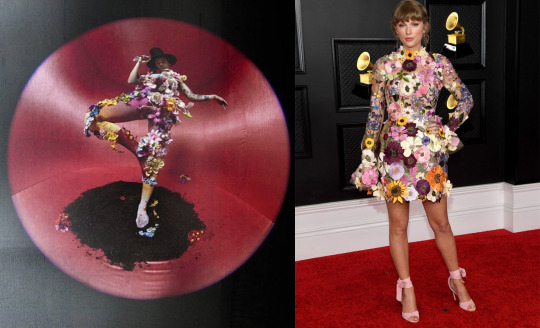
Sunflower is a sweet romantic song. It references HYGTG and Clean, reminding of her how it used to be to suggest dating again.
My Vol 1 - 5 theory
My theory on Vol 1 - 5 are times they dated or hung out. I have playlist grouped into possible volumes. There is more in the dates and timelines.
31 March 2012, 20 May 2012 - July 2012 (Everything has changed - IKYWT)
28 September 2012 - 3 January 2013 (HYGTG - NTWDT.)
25 August 2013 - November 2013 (Happily - Wonderland)
14 February 2014 - February 2015 (Style - FTDT)
February/29 April 2016 - May 2016 (High infidelity - IDWLF)
To me, Sunflower is contemplating a Vol. 6 (Fine Line/Lover). Sunflower hasn't been played since Live on Tour ended in 2021.
Lyrics
Sunflower Sunflower My eyes, want you more than a melody Let me inside Wish I could get to know you
I wanna get to know you is a reference to the Everything has changed "I just wanna know you better" which Taylor and Ed wrote the week after 20 May 2012.
Love 'I want you more than a melody' which reminds me of HYGTG “say you want me”
Sunflowers Sometimes Keep it sweet in your memory I was just tongue-tied
Wildest Dreams: "Say you’ll remember me standing in a nice dress, staring at the sunset, babe" and OOTW "I Remember.."
Harry describes Taylor as sunshine and butterflies and all things summer in many songs:
Olivia “You live in my imagination / The summertime, butterflies”
Watermelon Sugar: “summer evening”, “summer feeling”, “end of June”
Adore You: “your wonder under summer sky”
Canyon Moon: “sky never looked so blue”
They are tongue-tied in:
Two Ghosts "Tongue-tied like we've never known"
Sushi "Blue bubblegum twisted 'round your tongue"
Message in a Bottle "And I became hypnotized by freckles and bright eyes, tongue-tied"
I don't wanna make you feel bad But I've been trying hard not to talk to you Sunflower (Sunflower, sunflower)
Taylors Gorgeous has a similar line “You should take it as a compliment / That I'm talking to everyone here but you (but you, but you)”
I couldn't want you any more Kiss in the kitchen like it's a dance floor I couldn't want you any more tonight (Tonight, tonight, tonight)
Lover (feat. Shawn Mendes): "We could light a bunch of candles and dance around the kitchen, baby"
Wondering headshake Tired eyes are the death of me Mouthful of toothpaste Before I got to know you
Harry brushes his teeth before performing. He met Taylor backstage at the kids choice awards, I take wondering headshake to mean acknowledging each other when they first saw each other.
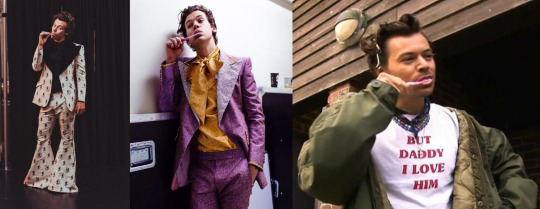
I've got your face Hung up high in the gallery I love this shade (Sunflower, sunflower)
To me the picture line is not a literal gallery, but a symbol that this person is his person. I think this song and line a response to HYGTG "Remind her how it used to be, be / Yeah, with pictures in frames of kisses on cheeks, cheeks" and You are in Love and has "he keeps a picture of you in his office downtown"
Your flowers just died Plant new seeds in the melody Let me inside, I wanna get to know you
Plant new seeds in the melody is the nicest line. It is a reference to:
Clean "The drought was the very worst / When the flowers that we'd grown together died of thirst".
Call it what you want: "All my flowers grew back as thorns / Windows boarded up after the storm" (more thorns and roses)
Chronologically then Harry says to plant new seeds and try again.
I don't wanna make you feel bad But I've been trying hard not to act a fool Sunflower (Sunflower, sunflower)
Harry has called himself a fool many times, here he is trying to be nonchalant and cool but before he's been all kinds of fool:
I just wanna love you "We can whisper, we can talk about these things / Reconsider my foolish ramblings"
Just a little bit of your heart "I know I'm not your only / But I'll still be a fool / 'Cause I'm a fool for you"
Fools gold "But I'm not done yet / Falling for you / Fool's gold"
Boyfriends "You love a fool who knows just how to get under your skin / You, you, you still open the door" and "You feel a fool / You're back at it again"
In the Long Pond Sessions Taylor later emphasised how James had been foolish, saying fool/foolish 7 times.
39 notes
·
View notes
Text
In this scene, when they’re about to throw spears, together they say Down Eros, Up Mars

which at first glance could simply mean love is nothing, and war everything, indicative of how their friendship is likely to fall apart.

As far as it goes in the book, Messala is quite upfront about his intentions, leaving Judah to choose between a future for their love, or a potential free one for his people


Here in the following scene, things are pretty much the same, on the surface at least. Yet if you pay close attention to the positioning of certain elements, the spears high up there on that cross/crucifix, and the two of them holding hands beneath it, you’ll begin to see the clever choice made to suggest this is a lover’s quarrel, for up there reigns Mars, and Eros is down where they are
#ben hur#ben hur 1959#the gay subtext has changed me as a person#and for the worse#gore vidal say he would say everything without using one line#and he’s a genius for that#i was motivated to read the book because of this#and i’m beginning to see every single change he made in that direction#it has consumed me#and is TOTALLY worth it#i’ve seen people trying to ignore the obvious#and well that is fine#for the beauty of any form of art is its interpretibility#even so I feel compelled to share how I perceive certain things#which is only EVERYTHING when it comes to this movie#charlton heston#stephen boyd#judah ben-hur#ben-hur#messala#they are best friends IN LOVE#you will either see it or choose to ignore it#analysis#my take#books#lew wallace#gore vidal#william wyler#movies#long post
14 notes
·
View notes
Text
Fine Line, my lyric analysis
#harry styles#fine line#lyric analysis#hslot#hslot harry#larries#larry stylinson#tpwk#favorite#top 10#writers and poets
45 notes
·
View notes